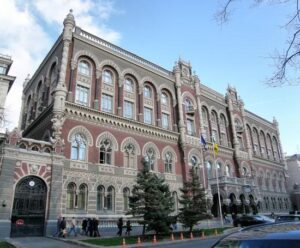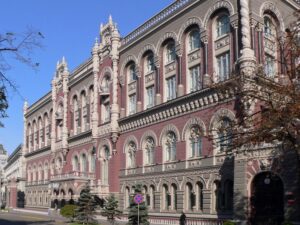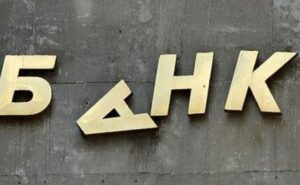
The National Bank of Ukraine (NBU) in 2022 will conduct scheduled inspections at six oversight objects to ensure that they comply with the requirements of the legislation on the activities of payment systems in Ukraine, the press service of the regulator said on Wednesday.
According to the report, in the first quarter the regulator will check AC DC Processing LLC and FC Feniks LLC, in the second quarter – Platiservice LLC, in the third quarter – PJSC Bank Familny, and in the fourth quarter – Ukrainian Payment system LLC and FC Kontraktovy Dim LLC.

The National Bank of Ukraine (NBU) has updated the requirements for confirming the sources of the formation of subordinated debt, financial assistance from shareholders and capital instrument with the terms of write-off/conversion, the NBU press service said on Tuesday.
According to the report, the right of the regulator to establish requirements for the sources of regulatory capital is provided for by amendments to Article 30 of the law on banks and banking activities. The changes approved by NBU Resolution No. 159 dated December 29, 2021 come into force on January 5.
In particular, banks, to include components in the regulatory capital, shall submit documents confirming the sources of their formation, taking into account the requirements of the regulation on licensing of banks, the NBU said in the press release.
In addition, the requirements for the interest rate, at which funds will be attracted on the terms of subordinated debt, have been updated, in particular, the bank will justify its size, the NBU said.

The National Bank of Ukraine (NBU) will raise the risk weight for unsecured consumer loans from 125% to 150% from January 1, 2022, the central bank’s press service reported on Friday.
The changes will help banks create an adequate capital cushion to cover unexpected losses from the deterioration in the quality of their unsecured consumer loan portfolio.
In addition, the resolution is intended to increase the lenders’ resilience to potential crisis phenomena, in particular, to stimulate proper consideration of both the advantages and risks of working in this segment.
The press service said that now, for every UAH 10 of the loan, the bank shall keep UAH 1.50 of regulatory capital.
In addition, from the beginning of the year, the NBU will introduce minimum requirements for capital coverage of operational risk in the amount of 50% of the estimated amount, with an increase to 100% from January 1, 2023.
The NBU also increased the risk weights on government bonds in foreign currency to 50% with a subsequent increase to 100% from July 1, 2022. To gradually bring domestic requirements in line with international standards, the risk weight is increased in stages and only for those securities that banks buy from April 1, 2021.
Also, the regulator will increase from the current 25% to 50% the share of the cost of noncore assets deducted from fixed capital.
This requirement to deduct the value of noncore assets from the fixed capital of banks is intended to induce banks to more actively release balance sheets from illiquid assets, which for the most part do not generate income, but are often reflected at an inflated value. The total impact of the planned changes on the banks’ fixed capital adequacy will amount to 2.5 percentage points, the NBU said in the report.

The National Bank of Ukraine (NBU) has added a systemic risk buffer to the list of capital buffers that should be generated by banks to increase their capability to withstand risks during periods of financial and economic instability, the press service of the regulator has said.
The changes were approved by NBU Board Resolution No. 131 dated December 3, 2021 on approving amendments to the instruction on the procedure for regulating banks in Ukraine, and entered into force on December 7, 2021.
To control the generation of capital buffers by banks in the approved amount, the term “combined capital buffer” has been introduced, defined as the aggregate amount of capital buffers set for a bank.
According to the updated instructions, banks independently generate a combined capital buffer. The regulator sets the size of the systemic risk buffer in the range of 0-3% of the bank’s total risk. The decision on the start date and the procedure for the generation of the systemic risk buffer by banks, its size or increase, the schedule for the gradual achievement of the approved size (if necessary) is made by the NBU Board, and shall contain information on the grounds and purposes of introducing/increasing the size of this buffer, a list of banks that are obliged to generate it and/or the criteria on the basis of which such banks are determined.
The press service recalled that in 2020, the NBU postponed the generation of conservation buffers and systemic importance buffers by banks due to the introduction of quarantine and restrictive measures related to the spread of the COVID-19 infection.
The National Bank will notify banks about the resumption of the formation of these buffers in the first quarter of 2022. The NBU will inform the date of the start of the formation of capital buffers and their values in advance, which will allow banks to take measures to comply with the requirements, the NBU said.

The result of a more coordinated work on the return of funds from failed banks may be an increase in the partial voluntary repayment of debts by former owners, First Deputy Governor of the National Bank of Ukraine Kateryna Rozhkova has said.
“What can happen and what we would like – perhaps the owners to some extent will be ready to voluntarily close debts,” she told Interfax-Ukraine, answering the question about the implementation of the paragraph of the Memorandum with the IMF on strengthening work on the return of assets of failed banks.
Rozhkova recalled that a working group was created at the government level, headed by the Prime Minister, which includes the governor of the National Bank and the head of the Deposit Guarantee Fund, which is engaged in boosting work on the return of assets.
“In fact, you don’t need to invent anything new, because PrivatBank has already passed a certain path: there are courts in Western jurisdictions, tools for how to do this – through courts in Ukraine or abroad,” the representative of the National Bank said.
Rozhkova said that all the documents that the NBU had, confirming certain abuses, were transferred to law enforcement agencies. According to her, the Deposit Guarantee Fund conducts due diligence with the involvement of audit companies to determine where and how assets were withdrawn for each of the banks, according to the schedule. Further, claims are being prepared, which should be transferred either to courts, or to law enforcement agencies here, or to other jurisdictions.
“I will also say an unpopular thing, but it is true: those banks that left the market have assets that they lost in Donetsk and Crimea [in the occupied territories]. And this was not a withdrawal of funds. There are assets that have ceased to be serviced when the hryvnia sharply devalued. Collaterals depreciated, loans increased. It cannot be said that the entire volume is the fault of shareholders. It is necessary to calculate, prove, divide, and where it is provable, move the traditional way,” Rozhkova said.
As reported, according to a memorandum with the IMF, by the end of December this year, the Prosecutor General’s Office is to publish a semi-annual report on the outcomes of criminal proceedings against former bank owners, managers and other related parties in each resolved bank since the beginning of 2014, with aggregate data on the number of persons investigated, tried, and convicted as well as the amount of fines and damage recovered.
The next benchmark in this area is the publication of a asset recovery strategy paper and an action plan for the return of assets of failed banks by the end of February 2022.

The National Bank of Ukraine (NBU) on September 9 made a decision to revoke the banking license and liquidate Bank Zemelny Capital (Dnipro) belonged to former Coal Industry Minister Viktor Topolov (94.4% of shares), the regulator has said on its website.
“At the suggestion of the Deposit Guarantee Fund, the NBU made decision No. 469-rsh dated September 9, 2021 to revoke the banking license and liquidate Bank Zemelny Capital,” the NBU said.
As reported, the NBU on August 11 classified Bank Zemelny Capital as insolvent due to the failure to meet its obligations to depositors and other creditors due to insufficient funds within the term established by the agreement or determined by the legislation of Ukraine.
Bank Zemelny Capital was founded in 1994. According to the NBU data as of January 1, 2021, the owner of the bank’s substantial participation is former Minister of the Coal Industry Viktor Topolov (94.4% of the shares).
According to the NBU, as of June 1, 2021, Bank Zemelny Capital ranked 63rd in terms of total assets (UAH 909.983 million) among 73 banks operating in the country.